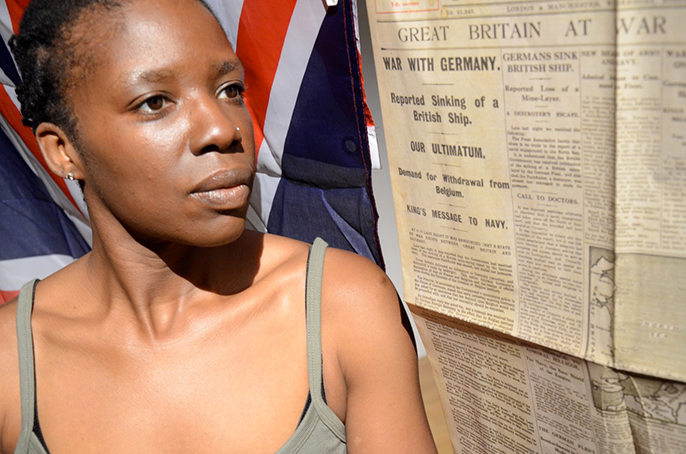Kat Francois – interview
Raising Lazarus
Thirteen years ago, a night out in Brixton changed Kat Francois’ life forever. The former sex-education teacher attended her first open mic night called ‘Singers and Poets’ and recalls being “blown away.” Francois returned the following month to claim the mic for herself and has been performing ever since. The West Londoner is friendly and direct, with a profound belief in art as a reformative tool. “I feel there’s still so much more to say, there’s so much more uplifting that people still need, and I feel strongly that I have the voice as an artist and performer and writer to speak about those things. To try and challenge and tackle them… I didn’t think I’d still be doing it all this time later, but I’m glad I am! (Laughs.)”
Francois’ current piece Raising Lazarus (see listing) tells the true story of her relative who left Grenada to serve in the First World War. Much like the playwright’s introduction to poetry, Francois’ inspiration for this piece happened quite by chance. She explains that it all began in 2009, after Francois booked a holiday to her mother’s birthplace, Grenada.
“My partner had never been, so he got a book on Grenada and came across a photo of a memorial to the soldiers who served in the First World War. He was like, ‘Kat, you’ve got a relative who died in the war. Here’s the name, Lazarus Francois.’ I told him to not be stupid, ‘cos of course I’d know about it if I had. But I asked my gran, who knows everything and she said ‘Yes. That was my father, your great grandfather’s first cousin.’”
This was a complete revelation for Francois, who describes herself as the nosy one in the family. “My mum came up from Grenada when she was 14, but still, she’d never heard of him. None of my aunts and uncles had ever mentioned this man. You know sometimes as black people, we bury the hurt in the family. It’s just too hard to talk about.”
They were so brainwashed and indoctrinated, coming from this tiny Caribbean island, they would put their lives on the line for a country they’d never seen.”
With so little known about her relative, Francois describes feeling compelled to unearth his story. “Sometimes you come across a story that’s so big you feel like there’s a pressure. I felt like ‘Oh my gosh, am I the right person to do this?’ It’s such a big subject, such a serious subject, so I felt a pressure, a burden. But after a while I felt like I had a right to follow this. This is my family history, Caribbean history, black history, English history. In school I was never taught anything about the Caribbean contribution to the World Wars. Lazarus’ story is similar to so many young Caribbean men who lost their lives fighting for Britain. I felt I had to tell Lazarus ‘story, but theirs as well.”
Francois combines spoken word, poetry and historical testimony in her solo show. She states that poetry is “a beautiful way to express yourself, saying a lot with a small amount of words. Poetry is emotive end economical. I can’t sing (laughs) so poetry enables me to express a level of emotion in a way that nothing else does.” Since winning the BBC Slam Championship in 2004, Francois has gone on to tour the world with her work. Not one to shy away from the big issues, Francois’ poetry deals with subjects such as identity, domestic abuse and institutional racism. But this piece proved especially challenging in that that there was little archived material. Francois comments “It was daunting. You’re dealing with the British establishment and this isn’t something they want to talk about. I think it’s a shame. These men weren’t paid the same as the white soldiers, their barracks were often rundown, they weren’t treated the same. You would think that with a common enemy all of that would be gone, but it wasn’t. These people suffered a lot.”
Francois is effusive as she describes her research for Raising Lazarus. She admits being shocked by some of her discoveries, such as an entire contingent sailing from Jamaica suffering severe frostbite due to inadequate clothing. The artist shares that what surprised her most was how eager these young men were to sign up.
“These people fought to get in the army. Not just men from the Caribbean, from Australia, Aboriginal men would change their names so they could enlist. It just shows how strong white supremacy and colonialism was, that we wanted to fight for king and country. These young men were gung ho, that’s still going on now, that hyper masculinity. They were so brainwashed and indoctrinated, coming from this tiny Caribbean island, they would put their lives on the line for a country they’d never seen.”
These men weren’t paid the same as the white soldiers, their barracks were often rundown, they weren’t treated the same. You would think that with a common enemy all of that would be gone, but it wasn’t. These people suffered a lot
Raising Lazarus is not only theatrical, but educational. It exposes the reality faced by thousands of men whose sacrifice has gone unmentioned. Francois explains that education and working with young people remains a key motivation in her work. She has created plays with youth theatre programmes at the Lyric, Roundhouse Camden and the Arcola. She also works extensively with Theatre Royal Stratford East, running amongst other things, ‘Poetry Platform’ a programme for 13- 18 year olds. Francois comments “I knew I was always going to work with young people, but I wanted to do it in a way that involved my passion for poetry and performance. The Theatre Royal Stratford East has been great for facilitating that. I struck up a really good relationship with Dawn Reid when she was Deputy Artistic Director and from there I’ve been able to run a lot of projects and workshops.”
Whilst Maya Angelou (read interview) is one of Francois’ favourite poets, she has a firm finger on the pulse of the emerging artists scene. She shares her admiration for Kate Tempest’s work ethic and praises the energy of Warsan Shire. Francois is also a fan of Raymond Antrobus; a poet with limited hearing who works creatively with hearing impaired kids. “I’m intrigued to see what he’s gonna come up with, how he’s gonna use his art to help and inspire young people and give them a voice. There’s a lot of people that are out there, still grinding and using their talent for good. It’s amazing how much great work is out there, especially in London where you could go to a different poetry show every night.”
Francois’ will be performing her own show in London’s Roundhouse Camden on May 28th. With characteristic enthusiasm, she expounds why people should come and see Raising Lazarus.
“Raising Lazarus is an important part of British history. Black British history. They’re entwined as much as we try to separate them. It’s a tale of a family and it’s also a historical piece told in a unique way. It’s a poignant time as we’ve got the 100 year anniversary of the battle of the Somme coming up and it’s a damn good piece of theatre.”
Info: Raising Lazarus is at the Roundhouse on May 28, 2016 | See listing


























